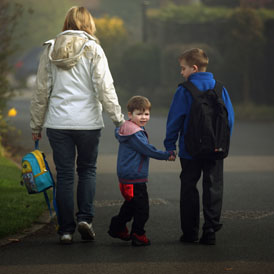‘Sexy’ videos and adverts targeted in childhood inquiry
An inquiry into the “sexualisation” of childhood is expected to call for an age rating system for music videos and for the banning of sexy adverts from being placed near schools.
The independent review, commissioned by David Cameron and launched last December, is to publish its findings on Monday.
The man behind the review Reg Bailey is also expected to recommend the creation of a new website that parents who wish to complain about overly-sexualised products can access.
Bailey, the chief executive of the Mother’s Union, was commissioned by the Prime Minister to look into what pressures exist that can force children to grow up too quickly.
Many parents feel their children are being targeted to become consumers and their environment contains too many sexual references.
Music videos and appearances on shows such as the X-Factor, from artists such as Rihanna and Lady Gaga came under criticism for their sexual content. Bother artists have very large followings amongst pre-teen children.
Mr Bailey is expected to recommend that the retail, advertising and video industries be given 18 months to clean up their acts voluntarily or face tougher government regulation.

His report will call for a single website to be set up as a gateway for parents to complain about the way products are marketed to children, to help them find their way through the confusing number of regulatory bodies.
Launching his inquiry in December, Mr Bailey said his concern was “the tone and the style of the way things are marketed to children”, adding: “When you are so bombarded by marketing and sexualised imagery, it almost becomes wallpaper.”
The Prime Minster said last year that he had told his own six-year-old daughter Nancy to stop listening to songs by Lily Allen because some of the sexual references in her lyrics were inappropriate for a child of that age.
He said then: “You can’t cut children off from the commercial world, but we should be able to help parents more in terms of trying to make sure that our children get a childhood and that they are not subject to unnecessary and inappropriate commercialisation and sexualisation too young.”
-
Latest news
-
As India goes to the polls in the world’s largest election – what do British-Indians think?6m

-
Tees Valley: Meet the candidates in one of the biggest contests coming up in May’s local elections4m

-
Keir Starmer says public sector reform will be a struggle7m

-
Nicola Sturgeon’s husband Peter Murrell charged with embezzlement of funds from SNP1m

-
Ukraine might finally get $60billion in American weapons and assistance to defend against Russia3m

-




